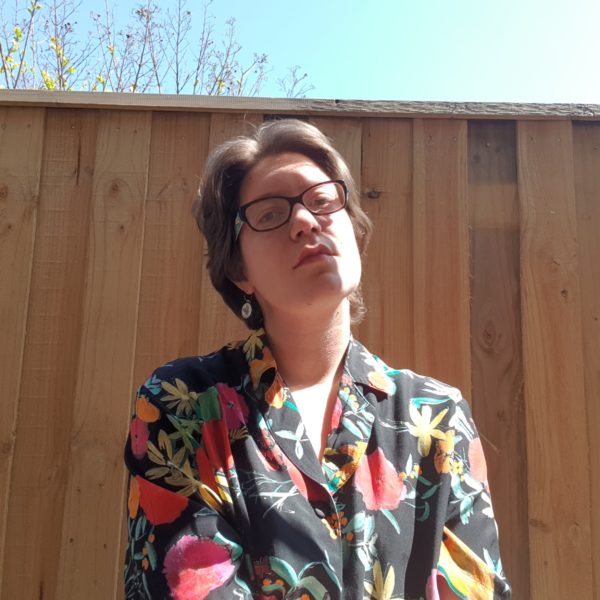25 October 2019
Meet the 2019 Deakin University Nonfiction Prize shortlist – Danielle Scrimshaw

Danielle Scrimshaw, 22, Vic
“Be Gay, Do Crimes: Or, The Ballad of Catherine and
Ellen”
How did you begin writing?
I started writing about ten years ago, when I was 12. Funny to say, but it was Richelle Mead’s Vampire Academy series that really got me hooked on literature. After binge reading the first four books I started writing my own high school fantasy novel (basically Vampire Academy but with fairies instead of vampires; real revolutionary stuff) and decided that I wanted to be an author.
I mostly wrote short stories to amuse my friends, including some outrageous fanfiction in which I’d recreate stories like Harry Potter and The Lord of the Rings but with my group of friends as the main characters (they’re so dumb but were all very fun to write; I admittedly still cackle at my old jokes when I reread these). There was also a science fiction novel that I thought would be adapted into a killer movie franchise (it has since been abandoned </3). I wrote a lot during my high school years, and most of it’s garbage, but it was a start.
Why do you write nonfiction?
Very simply, because I enjoy it. But I never used to until very recently – for years I avoided nonfiction because I thought I was bad at it. In the last semester of my creative writing major I took a class that was coordinated by Maria Tumarkin, who is amazing. She was just so encouraging, and pushed for a collaboration between genres and styles. I ended up writing my assignment for that class on a variety of subjects, but mostly it was a commentary on Australian identity – it also became my favourite published piece, thoughts & feelings with paul keating.
Creative nonfiction appeals to me because I like writing about things that occur in my everyday life, and I love presenting history in a way that isn’t a dense academic read
(not to say that all history writing is dense or academic, that’s definitely a stereotype, but there’s also no way I could have gotten away with writing my history honours thesis in the same style as thoughts & feelings). There’s really no other form that allows me to write about Australian prime ministers, my crush, Jimmy Barnes, nineteenth-century lesbians, anxious dating experiences, Woolworths, vague childhood memories and Thursgay all in one go.
Tell us a bit about your submission to the Deakin University Nonfiction Prize:
My essay is centred on the phrase “be gay, do crime” and two women, Catherine Owens and Ellen Scott, who were lovers and convicts in the early nineteenth century. The piece is a nice mix of memoir and history, with a lot of personal reflections and vignettes that relate to being gay and/or doing crime. It focuses on the themes of gender and sexuality, in both colonial and modern Australia, as well as navigating stories of crime and theft on stolen land.
Why did you choose to write on this subject?
This year I’ve been writing on women and homosexuality in Australia from the 1840s to the 1920s for my honours thesis. I researched convict women as part of this, but a lot of the information I gathered didn’t end up in the thesis. I still wanted to utilise my notes, though, and was really intrigued by the stories of Owens and Scott, so I decided to centre this essay on them. Last year when I was telling a friend about these particular women, she said “they are the epitome of ‘be gay, do crime’”, and since then I haven’t been able to look past the connection.
I wanted to focus on these women because I don’t think there’s really much discussion or education on Australia’s queer history – most, if not all, of what I know on the topic is through my own independent research. My thesis is only one tiny contribution, but I’d like queer histories to break out of a strictly academic field and see more ‘popular’ writings on the subject. Creative nonfiction is part of that endeavour.
There’s also plenty of other stuff in Be Gay, Do Crimes that actually isn’t about Catherine Owens and Ellen Scott. There’s stolen land, time theft, swimming at a public pool with unsaved legs, a queer elder, nineteenth-century cross-dressing, Cold Chisel, drinking in the Carlton Gardens, my first kiss, and a bit of a roast on John Batman. Something for everyone, you could say.
What’s the best piece of writing advice you’ve ever received?
I very clearly remember handing in my first year 10 English essay, on The Truman Show. My teacher read the first line, crossed it out, and said “boring”. To this day I credit him as the person who improved my writing the most – not just for school essays, but everything. It was a completely savage move and little fifteen-year-old me, so used to the sugary praise of my previous teachers, was shook to her core. The best (slightly indirect) advice I’ve received over the years is to lean into my difference, to not be boring. Some of my most recent work I considered so weird that I cackled whilst writing the first draft, thinking to myself “my class is going to think this is a huge trash meme.” They didn’t though, they took it seriously, and I was a little confused at first (“blending Paul Keating and gay panic works?”), then encouraged to push it further. With each new piece I try to outdo myself now. There’s just something so satisfying in not limiting that strangeness.
Who are some of your favourite nonfiction writers?
Bruce Pascoe, Virginia Woolf, Greg Dening, Eloise Grills and Clare Wright



